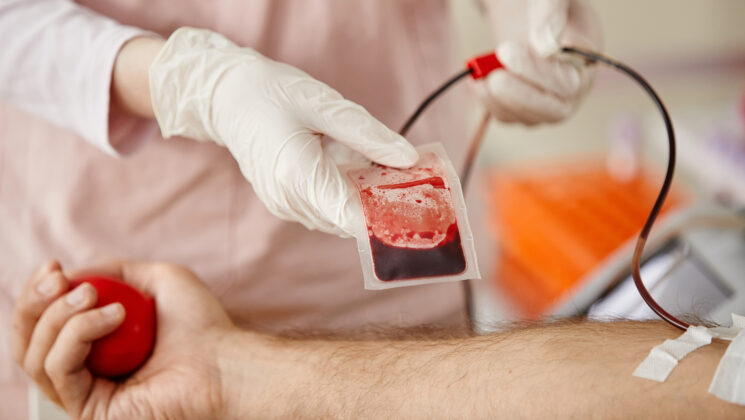Image: Bigstock
In October last year, the NHS Blood and Transplant service (NHSBT) declared an amber alert over blood supplies, for the first time ever.
Normally, the NHSBT would be expected to hold a stock of at least six days’ worth of each type of blood at any one time. At the time of the announcement, the service had only three days of stock of most blood types, and two days of O-type blood, a particularly important variety due to its universal applicability, which makes it vital in emergency situations where the patient’s blood type is unknown.
The alert put hospitals on notice that the service may not be able to maintain the supply they might expect, and that they should take steps to limit non-urgent use of their stocks – including cancelling some non-urgent operations where necessary – to protect that supply.
According to Bev Easton, chair of the UNISON NHSBT Forum, “After that, the Department of Health, who had ignored us for a long time, became very interested in what we do.”
Blood, and so much more
“The general public will know us for collecting blood, or organ donation,” says Bev, while adding that the service NHSBT has a wide range of other functions. It takes whole red blood cells and manufactures a variety of products from platelets to plasma, each used for different purposes. And, as well as the more well-known transplantable organs, like livers and kidneys, it can also accept things like skin, tissue and eyes.
“Pretty much everything else can be donated to NHSBT. We research products, we manufacture them. We can make bespoke heart valves and knee replacements. We support people with sickle cell disease, which particularly affects ethnic minorities, who need transfusions regularly.
“And we do our own transport, taking products all across England and between countries or devolved nations.”
A wide range of staff
Overall, there are over 6,500 staff at NHSBT, from drivers to researchers, nurses to product manufacturers.
The most common role is donor carer, with about 2,500 in the service. Their job is to travel the length and breadth of the country, setting up their stations in village halls, schools, or wherever might be suitable, to look after members of the public who give up a pint of blood and 15 minutes of their time. Donor carers generally earn between £20,000 and £23,000 a year.
Blood can only be stored for just over a month, so maintaining the supply is a constant battle for NHSBT, Bev says. “We collect roughly 35,000 units of blood per week, and we have to maintain a six-day supply of stock in our fridges of the six main blood groups.”
A blood donation team, with nine staff and nine chairs, can collect up to 160 donations in a six-hour period, though their days are inevitably longer than the six-hour “bleed time”.
Bev, who joined the service in 2002 as a donor carer, explains: “You have to drive there, unload all the heavy equipment, take the donations for six hours, then do the exact reverse to get home. Your days can be long. The service runs seven days a week, across the country.”
At least, that’s how it supposed to run. NHSBT is an arms-length body and gets its funding directly from the Department of Health. Cuts to that funding, since 2010/11, have meant that they are doing a lot more, with less staffing.
“We’ve got to be more efficient and proficient to maintain the supply and the quality of the products we make,” says Bev. “Teams meant to run with nine staff and nine chairs are going out with six staff and nine chairs.”
Under pressure
Over the COVID-19 pandemic, maintaining the supply was a particularly acute, uphill battle, with social distancing measures forcing a reduction in capacity. In highlighting how vital the service is, Bev notes that during lockdown, “It was one of the few places you were allowed to go. You could go get a pint of milk or go give a pint of blood and that was about it.”
It may seem understandable that the blood supply, and those protecting it, came under pressure during such an unprecedented time. “But this isn’t COVID anymore,” says Bev. “The staff are tired, they’re emotionally drained and exhausted, because the NHSBT has to run a very tight ship – even in normal times – to protect the supply.”
Earlier this year, UNISON members in the NHSBT voted overwhelmingly in a re-ballot to join industrial action in the ongoing NHS pay dispute.
When asked why staff had voted to strike, Bev says: “Within our own environments, since 2010 we’ve seen an erosion of giving a “gold service” to donors, because of the reduction in the staffing model. We’ve had two disputes specifically about the staffing model of blood donation in the last five years. People are deciding to leave our organisation to stack shelves at Tesco, because it doesn’t feel like the government appreciates what we do.
“The government has cut budgets for so long, for both the NHS and NHSBT. We voted to come out, not just for ourselves, but in solidarity with the rest of the NHS.”
After a short, intense campaign to build up stocks of blood late last year, the service rescinded the “amber alert” as stocks stabilised. However, without a pay deal which retains staff and allows the service to recruit more easily, and without further funding from the Department of Health, it’s likely that stocks will be walking a fine line for the foreseeable future.
Members at the service had been due to join the strike set for 8 March that has been postponed, in good faith, for joint health union talks with the government. Should the talks not prove fruitful, those members remain ready to go on strike.


